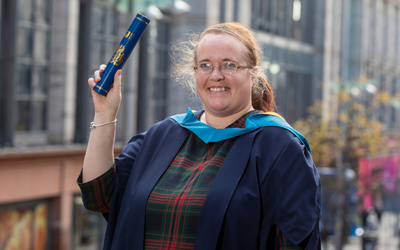Jenni Pirrett
 Following in her mother’s footsteps to gain a degree from The Open University in Scotland, Jenni Pirrett hopes to set an example to other people with disabilities that they too can gain a university degree.
Following in her mother’s footsteps to gain a degree from The Open University in Scotland, Jenni Pirrett hopes to set an example to other people with disabilities that they too can gain a university degree.
Beginning her Bachelor of Arts Open degree with The Open University (OU) in Scotland at the age of 35, Jenni Pirrett from Strathaven, South Lanarkshire, wanted to prove wrong anyone who said you couldn’t gain a degree with a learning disability.
She explains: “Someone told me I would never get a degree with my learning disabilities, having dyslexia and dyscalculia…I wanted to show people who have any learning disabilities or health issues, don't let anything step in your way to gain your goals.”
Dyslexia makes it difficult to read or interpret words, letters, and other symbols, while dyscalculia is a persistent difficulty in understanding numbers which can lead to a diverse range of difficulties with mathematics.
Jenni, now aged 40, returned to studying in 2013 to gain her Higher grades and welcomes that qualifications are not a barrier to studying at university level with The Open University, while the Part-Time Fee Grant gave her the financial support to do this.
‘Tutor support amazing’
Alongside dyslexia and dyscalculia, Jenni has also had to manage type 1 diabetes and epilepsy during her studies. She found it helpful to plan ahead for Tutor Marked Assignments by doing research in advance, and says that the flexibility and tutor support that the OU offers its students is “amazing”.
She particularly welcomes the support she received from her study skills tutor in her first year, who taught her how plan, study and lay out her planning for assignments, including using mind mapping.
Jenni says she also received a lot of support from the OU when she ended up having to submit her first End of Module Assessment from her hospital bed after becoming seriously ill with a kidney stone and being diagnosed with diabetes, adding: “Some lecturers were amazed about my determination while enduring pain.”
‘Late grandparents would’ve been proud of me’
The OU has given me confidence, how to plan ahead, and how to be more positive and how you can achieve your goals whatever your disability.”
Jenni’s family has been a huge inspiration to her. She was partly motivated to study with the OU in Scotland after seeing her mother study for an OU degree when she was younger and getting to attend her graduation, although her mother’s experience was very different, using typewriters or submitting handwritten work.
Her grandparents were also a key motivation in completing her degree, and she says: “I would like to dedicate my degree to my late grandparents, who would have been so proud of me, especially my late Nana Marshall, who died while I was studying. My nana was the last remaining grandparent to see me start my degree.”
‘You can achieve your goals whatever your disability’
Now that she has completed her degree, Jenni says: “The OU has given me confidence, how to plan ahead, and how to be more positive and how you can achieve your goals whatever your disability.”
Jenni enjoyed psychology, mental health and counselling skills during her degree and hopes to help children that are dyslexic and autistic in the future.
To anyone with additional support needs thinking of studying with the OU, she comments: “Never give up, always stay positive. Accept the help and assistance from the OU, they are there to help out.
“Show people who are negative about people learning that have disabilities, who say to you, ‘You can’t do this due to your disability’. Show them they are wrong and prove to yourself you can do this.”
Discussing how it feels to graduate, Jenni says she feels “overwhelmed, happy, and emotional”.
She concludes: “I will miss studying very much, but I will return and finish my Honours. I’m still on cloud nine to be honest. I’ve proven to myself that I can do this and shown others I can complete a degree with a disability.”